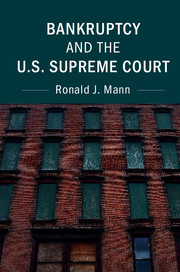Book contents
- Frontmatter
- Contents
- List of Figures
- List of Tables
- Preface
- Introduction
- PART I SETTING THE STAGE
- PART II THE HARD CASES
- SECTION A MISSED OPPORTUNITIES: CONGRESS, THE COURT, AND THE BANKRUPTCY CLAUSE
- SECTION B INTERPRETIVE STRATEGY: THE COURT, THE SOLICITOR GENERAL, AND THE CODE
- 7 Bankruptcy versus Labor Law: Bildisco
- 8 Bankruptcy versus Environmental Law: MidLantic
- 9 Bankruptcy versus Criminal Law: Kelly
- 10 Setting Text against Tradition: Ron Pair
- 11 Bankruptcy and State Sovereignty: BFP
- PART III AMICI AND THE COURT
- PART IV CONCLUSION
10 - Setting Text against Tradition: Ron Pair
from SECTION B - INTERPRETIVE STRATEGY: THE COURT, THE SOLICITOR GENERAL, AND THE CODE
Published online by Cambridge University Press: 04 May 2017
- Frontmatter
- Contents
- List of Figures
- List of Tables
- Preface
- Introduction
- PART I SETTING THE STAGE
- PART II THE HARD CASES
- SECTION A MISSED OPPORTUNITIES: CONGRESS, THE COURT, AND THE BANKRUPTCY CLAUSE
- SECTION B INTERPRETIVE STRATEGY: THE COURT, THE SOLICITOR GENERAL, AND THE CODE
- 7 Bankruptcy versus Labor Law: Bildisco
- 8 Bankruptcy versus Environmental Law: MidLantic
- 9 Bankruptcy versus Criminal Law: Kelly
- 10 Setting Text against Tradition: Ron Pair
- 11 Bankruptcy and State Sovereignty: BFP
- PART III AMICI AND THE COURT
- PART IV CONCLUSION
Summary
Three years after Midlantic, the Court took up another case involving a provision of the Bankruptcy Code that appeared plain on its face but had a conflicting pre-Code common-law history. In Ron Pair, for once, the Court reversed interpretive course, finding that the language of the Code was so clear that pre-Code judicial decisions could not limit the statute's meaning. It is not, we think, a coincidence that the Court picked this case to follow that approach, when it had the effect of draining funds from the bankruptcy estate by allowing secured creditors (in this case the Internal Revenue Service) to collect post-filing interest.
THE FACTUAL SETTING
In the wake of the U.S. recession of the early 1980s, a mid-sized Michigan firm filed for bankruptcy. The bankruptcy involved neither large sums of money nor scandal. Despite its lack of distinction – or perhaps because of it – the bankruptcy produced a legal wrangling that reached the Supreme Court four years later. Although the firm has lost its eponymous name (and now calls itself Midwest International Standard Products), the business survives to this day, at the same location near the north end of Lake Michigan. Ron Pair was, and still is, in the business of industrial air purification. The company manufactures and installs devices that minimize the dust created in the loading of shipping containers. Ron Pair's originally revolutionary devices attach to the end of the tubes which suck material out of storage bins and deposit it into containers. The devices regulate the transfer of substances from bin to container and reduce the amount of dust generated during the loading process.
The relevant problem was that Ron Pair failed to forward various tax payments to the Federal Government in the years before it entered bankruptcy. As a result, the Internal Revenue Service (IRS) obtained a tax lien on Ron Pair's assets. Then, while the company was in bankruptcy, the IRS sought to recover not only the principal amount of the unpaid taxes, but also interest on its tax claim up to the date it was paid. Ron Pair conceded that it owed the IRS interest that had accrued before the bankruptcy petition was filed. The company contended, however, that the Government was not due interest that had accrued post-petition. The Government's efforts to collect post-petition interest spurred a dispute that eventually reached the Supreme Court.
- Type
- Chapter
- Information
- Bankruptcy and the U.S. Supreme Court , pp. 158 - 173Publisher: Cambridge University PressPrint publication year: 2017



